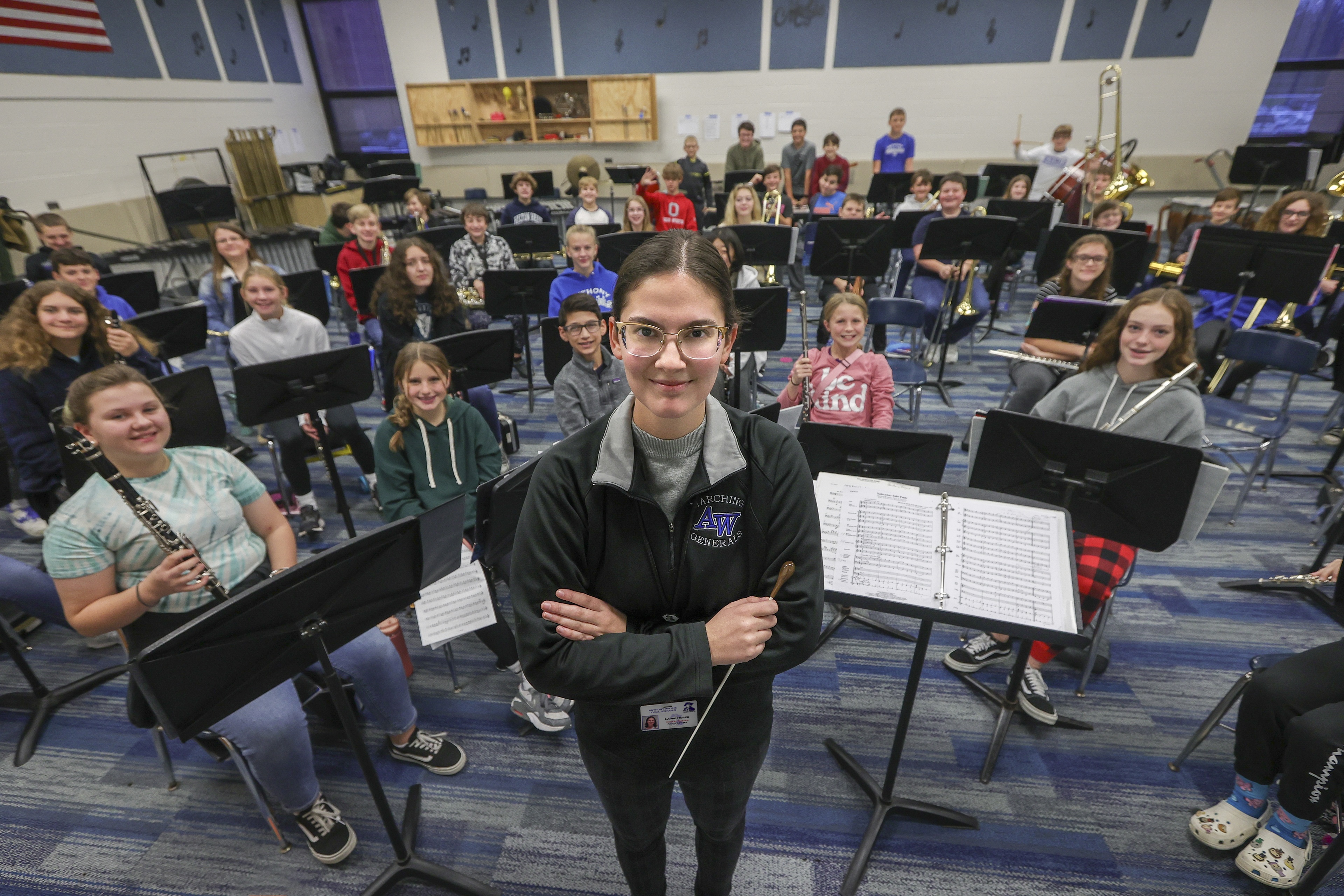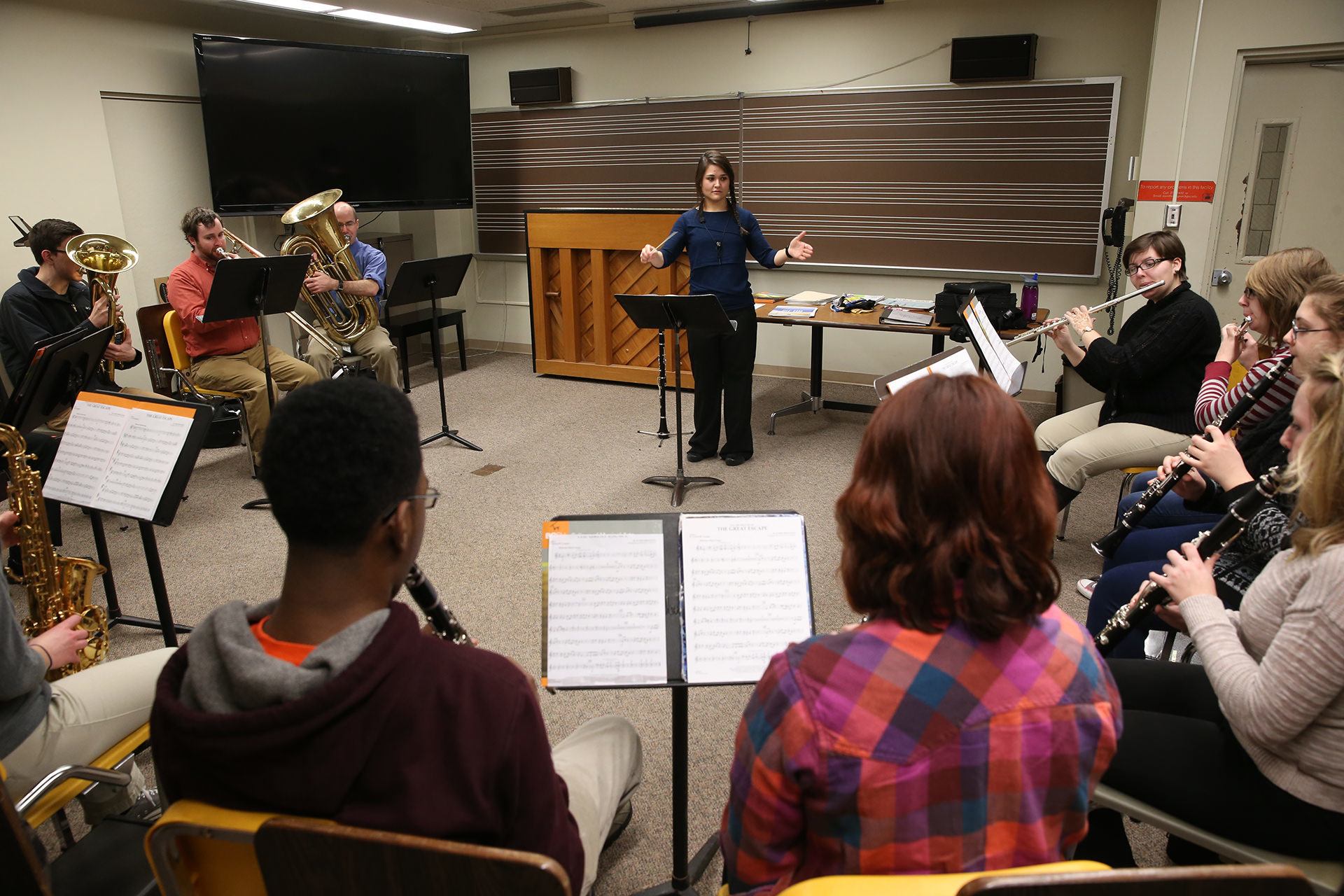Nationally recognized for student experience
The Wall Street Journal

Bachelor of Music (B.M.)
Music Education
Earn a music education bachelor’s degree from Bowling Green State University and shape the lives of young students through the power of music.
BGSU is recognized as one of the best colleges for music education. Graduates of our accredited Bachelor of Music in music education programs find rewarding music teacher jobs in pre-K, elementary and secondary schools.
BGSU music education majors may specialize in:
- Classroom/general music
- Choral music
- Instrumental (band/orchestra)
Why study music education at BGSU in Ohio?
- Learn from the finest in the field. The BGSU Department of Music Education is one of the largest and most versatile in the country. Our music education faculty are passionate, accomplished and highly respected. Faculty-to-student ratio in the music education degree program is 6:1.
- Gain real-world experience in cooperative schools and community programs under the direct guidance of faculty.
- Proven record of success. Prestigious honors, such as the Ohio Music Education Association Teacher of the Year and Young Teacher of the Year, have been awarded to numerous BGSU alumni – sometimes several years running.
- Modern music facilities. The Moore Musical Arts Center has more than 70 practice rooms, an 822-seat concert hall, a 221-seat recital hall and state-of-the-art computer labs and recording studios.
- Accreditation. The BGSU bachelor of music education program is accredited by the National Association of Schools of Music (NASM). The BGSU College of Education, including the Department of Music Education, is accredited by the Council for the Accreditation of Educator Preparation (CAEP).
- Opportunities to get involved.
- Join organizations such as the Ohio College Music Teachers Association.
- Take advantage of hundreds of annual performance opportunities.
- Take on leadership roles helping to organize on-campus shows and festivals.
- Volunteer with peer-to-peer teaching or at local schools as a teaching assistant.
- Mentor inner-city public school students with the Music Plus program or middle school musicians in the Middle School Academy Band program.
- Supportive music community. The BGSU MidAmerican Center for Contemporary Music showcases standout student works and performances, advances student music projects and research and produces a radio series with WGTE-FM in Toledo.
- Expand your reach.
- Explore study abroad opportunities.
- Participate in world music ensembles.
- Apply for travel conference grants from Pro Musica.
- Network with professionals in the Ohio Music Educators Association.
- Make a difference as a music teacher. Research shows that music classes sharpen cognitive skills, build self-confidence and forge stronger social connections. Students with a solid foundation of music education consistently perform better academically.
97% of BGSU music education graduates report they’re employed, in graduate school or starting a business within 6 months of graduation.
#1 public university in Ohio for career prep
The Wall Street Journal
Career – what can you do with a music education degree?
For people with a passion for music and desire to shape the future, a music education degree promises personal fulfillment, financial stability and service of a greater good.
BGSU is hailed as one of the best colleges for music education because our graduates land great music teacher jobs right out of the gate. The Bachelor of Music in music education degree qualifies graduates to obtain licensure to teach music in grades pre-K through 12.
Exact occupational outlooks for music teaching jobs depend on one’s district and specialization. In general, music teacher job opportunities are expected to remain steady, according to the U.S. Bureau of Labor Statistics.
Career paths
- Elementary school music teacher
- Middle school music teacher
- High school music teacher
- Band teacher
- Orchestra teacher
- Junior and senior high school choral ensembles teacher
Quick Facts from the Bureau of Labor Statistics
Curriculum
Students earning a music ed degree choose their specialization:
- Choral – ideal for students hoping to teach junior and senior high school choral ensembles
- Instrumental – perfect for students who someday want to teach band and/or orchestra at elementary and secondary levels
- Classroom/general music – smart for students looking to teach elementary and secondary school general music
Music education learning outcomes aim to instill superior:
- Teaching effectiveness. Integration of effective K-12 music teaching practices, such as creating and implementing music lesson plans and student music learning assessments.
- Musicianship. Performance in public recitals and ensemble performances in a varied repertoire of music on primary instruments. Demonstration of aural, keyboard and secondary instrument skills.
- Critical thinking skills. Capability to critically evaluate music education field experiences and teaching skills.
Students must choose a performance emphasis and pass annual jury examinations, which include three functional piano proficiency exams.
Core requirements include lessons in music techniques, conducting and methods. Music education students must participate in at least one ensemble every semester except while student teaching. Degree specializations determine exact ensemble requirements.
Several music education courses incorporate field-based experiences, starting sophomore year. The student teaching assignment is senior year. Performance of a half recital is required for graduation, though a full recital is encouraged.

Sample courses
- Music Theory/Aural Skills
- Instrumental/Vocal Techniques
- Class Piano
- Conducting
- Applied Lessons
- Performing Ensembles
#1 university in Ohio – big or small, public or private – students would choose again
The Wall Street Journal
The Music Education Department is part of the BGSU College of Musical Arts.
Accreditation
The Bowling Green College of Musical Arts is accredited by the National Association of Schools of Music (NASM) and is in good standing. The Music Education (PK-12) bachelor’s degree is an approved education program by the Ohio Department of Higher Education, pursuant to Ohio Admin. Code § 3333-1-05.
Bowling Green State University [BGSU] is accredited by the Higher Learning Commission. BGSU has been accredited by the Higher Learning Commission since 01/01/1916. The most recent reaffirmation of accreditation was received in 2022-2023, with our next reaffirmation of accreditation scheduled for 2032-2033. Questions should be directed to the Office of Institutional Effectiveness.
Request Information
Updated: 08/05/2025 03:16PM

